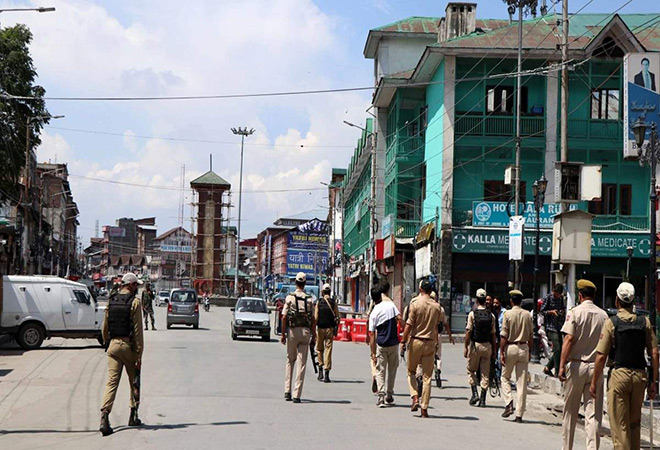
The standoff in Eastern Ladakh has grabbed the attention of the entire nation towards a belligerent China that seeks to challenge the status quo on borders amidst a global pandemic. While in the rest of India, there is a popular sentiment against Chinese goods and services which have now become a symbol of scorn, the reaction in Kashmir Valley to developments along the LAC has been unusual.
On 17 June, former chief minister of Jammu and Kashmir Omar Abdullah was forced to deactivate his twitter handle for a few hours after a widespread trolling campaign that criticized the public opinion on the Ladakh situation. The former CM’s
tweet read: “Those Kashmiris tempted to look towards China as some sort of saviour need only google the plight of Uighur Muslims. Be careful what you wish for.”
Immediately after this post, a storm of tweets appeared on his timeline criticizing, ridiculing, and denouncing his stand on the issue. Omar was caught off guard with the deluge of negative reaction that his tweet generated, and which subsequently led to the deactivation of his account. However, the tweet and the response it generated highlighted a disturbing trend that has emerged ever since the first news report of the border stand-off between India and China .
Kashmiris and a significant section of the population in Jammu have used the standoff as a means of catharsis. Using humour, satire, and sarcasm – memes in the internet parlance – the local population has left no stone unturned to mock the government of Prime Minister Narendra Modi for the Chinese belligerence. On the streets of Srinagar, the most common greeting is “cheen kot woat?” (where has China reached?) – clearly alluding towards the ongoing border situation. Some online memes have started showing Xi Jingping dressed in Kashmiri attire, some even show him cooking Wazwan.
Be it a salon, a funeral, or the local bakery, China dominates every single conversation. Another common jibe “cheen woat Sonmarg” (China has reached Sonmarg) suggests that the Kashmiri population would not mind losing entire districts of Ladakh and Kargil as long as it dents the image of the government in power.
People have sharply focused their antennas to the ongoing situation consuming minute by minute updates even on slow speed internet. Screenshots, weblinks of Chinese state media, particularly the Global Times, are spreading like wildfire on WhatsApp. Stone pelters at the Sunday gunfight site inSrinagar raised "
cheen aya, cheen aya" (China has arrived, China has arrived) slogans to mock the security forces deployed to deal with the law and order situation.
Among the intelligentsia in Kashmir, the Chinese aggression, by and large, is seen as a blessing in disguise which would help in easing the iron fist grip of the Modi government’s policy approach towards Kashmir. A common line of argument that is doing rounds in the valley is that the central government can only unleash its power against Kashmiris or Pakistan, and that it lacks the spine when it comes to big powers like China.
There is also an attempt to link the Chinese aggression with the constitutional changes and down gradation of the now erstwhile state of Jammu and Kashmir. The people in the valley think that whatever China is doing is a well thought out plan between Islamabad and Beijing to occupy territory and teach the BJP a hard lesson.
Whereas on social media, the reaction to the border stand-off has been mostly to lampoon and rub salt on injury, the offline conversation suggests that the people are well aware of Chinese mistreatment of minorities and their pathological hatred for Muslims. Moreover, there is a realization that the aggravation of conflict may result in a war which in turn will bring havoc and destruction to Kashmir, Jammu and Ladakh together. Despite that, the people are seeing China’s aggression as a lesser evil simply because it doesn’t affect their lives and livelihood directly.
In the eyes of people in the valley and some parts of Jammu, the hard-line policies of the Modi government can only be contained by an external factor. There cannot be a better indicator of the absolute alienation even among the pro-India lot in Kashmir. Not surprisingly, mainstream leaders have used the current situation to lash out at the central government on the abrogation of Article 370. The border standoff has given wings to mainstream parties who are now showing the temerity to question the policy of the Modi government openly.
Former CM Mehbooba Mufti launched a sharp attack on the Modi government through a
tweet stating: “Illegal abrogation of Article 370 was done to take over land & disempower locals. Today China has grabbed Galwan valley & GOI isn't even acknowledging it. Was J&K dismembered to gift territory to China.”
The National Conference on June 19 used the occasion to
demand the restoration of Pre August 5th position of Jammu and Kashmir. This was the first significant statement of the party signed by 12 senior-most functionaries after the release of its leaders from detention.
The fact that Chinese bullying is compared to the actions of the government of India should worry the security establishment. The police chief of Jammu and Kashmir has already sounded alarm bells suggesting that Pakistan may use the opportunity to provoke violence within Kashmir valley and other parts of J&K:
“Pakistan will try to infiltrate more militants and terrorists and also give impetus to violence in the Kashmir Valley and elsewhere in J&K, taking advantage of the standoff on Ladakh border.”
Given the public reaction, the security establishment is anticipating not just a spike in militancy but fearing mass protests and unrest too. The pent up frustration and resentment against the policies of the central government, particularly after August 5, is unprecedented. The communication lockdown and subsequent crackdown of the law enforcement agencies against individuals promoting separatism resulted in a silencing of both the separatist element as well as the mainstream in Kashmir.
The public response in Kashmir to the Chinese aggression should worry New Delhi and serve as a wake-up call. The situation becomes trickier in the absence of credible counter-narratives that expose China in the eyes of the public. The prime time warriors on TV very nonchalantly label all Kashmiris as anti-national and in doing so further push them into the clutches of Chinese propaganda.
Furthermore, the callous experimentation on matters concerning Kashmir over the last few months suggests that a change of course is too much to expect from those at the helm. But the least the government can do is to start seeing Beijing as the primary troublemaker in Jammu & Kashmir – too much attention has been given to Pakistan when it was clear that the big strategic plans on the erstwhile state of Jammu and Kashmir are owned by the Chinese.
The views expressed above belong to the author(s). ORF research and analyses now available on Telegram! Click here to access our curated content — blogs, longforms and interviews.



 The standoff in Eastern Ladakh has grabbed the attention of the entire nation towards a belligerent China that seeks to challenge the status quo on borders amidst a global pandemic. While in the rest of India, there is a popular sentiment against Chinese goods and services which have now become a symbol of scorn, the reaction in Kashmir Valley to developments along the LAC has been unusual.
On 17 June, former chief minister of Jammu and Kashmir Omar Abdullah was forced to deactivate his twitter handle for a few hours after a widespread trolling campaign that criticized the public opinion on the Ladakh situation. The former CM’s
The standoff in Eastern Ladakh has grabbed the attention of the entire nation towards a belligerent China that seeks to challenge the status quo on borders amidst a global pandemic. While in the rest of India, there is a popular sentiment against Chinese goods and services which have now become a symbol of scorn, the reaction in Kashmir Valley to developments along the LAC has been unusual.
On 17 June, former chief minister of Jammu and Kashmir Omar Abdullah was forced to deactivate his twitter handle for a few hours after a widespread trolling campaign that criticized the public opinion on the Ladakh situation. The former CM’s  PREV
PREV


